辽师大版小学英语(2011三年级起点)六年级下册知识总结unit1-2
辽宁师范版小学英语六年级下册Unit11_第2课时知识点总结教案
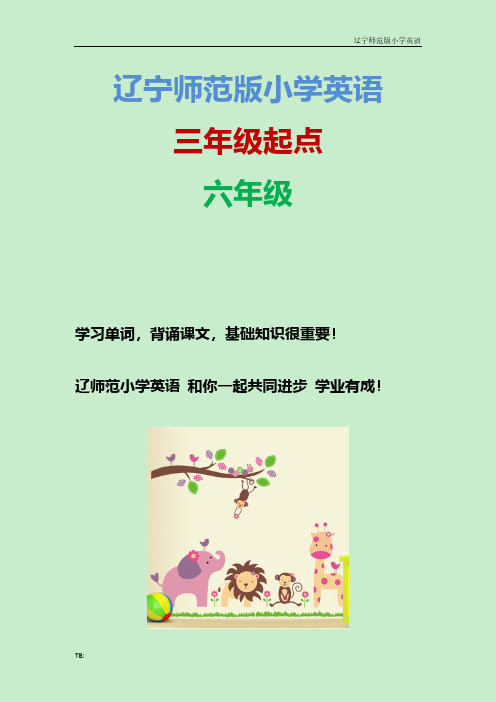
( )(2) Did you go to see a film yesterday?
( )(3) Who grew bigger last year, you or your father?
( )(4) Were you eleven last year?
A. No, I wasn’t.
B. Yes, I did.
辽宁师范版小学英语
辽宁师范版小学英语 三年级起点 六年级
学习单词,背诵课文,基础知识很重要! 辽师范小学英语 和你一起共同进步 学业有成!
TB:
辽宁师范版小学英语
Unit11 第 2 课时教学设计
【内容来源】辽宁师范大学出版社(三起点)六年级下册 Unit11
【主 题】The class play
三、课前准备(Teaching preparation)
课文图片、教学音频等。
四、教学建议 (Teaching suggestions)
Step 1: Warm-up
1. 问答练习。教师请学生用“What did you do...? I...”进行问答,复习一般
过去时。
2. 教师说动词原形,学生说出相应的过去式。可以配合不同速度和节奏以
Unit 11
【教学反思】
TB:
辽宁师范版小学英语
相信自己,就能走向成功的第一步 教师不光要传授知识,还要告诉学生学会生活。数学思维
可以让他们更理性地看待人生
TB:
6. 教师引导学生自读 A joke 中的内容并画出生词,并利用图片及上下文猜 测词义。然后小组合作画出动词过去式,写出其动词原形,自学单词和短语。 如果还有不懂的地方,可以请老师讲解。
7. 学生打开书,跟录音齐读 A joke 中的短文。然后教师检查学生们的朗读 情况,可以抽查个别学生或每个学生读一句,也可以请两位同学,一人读英 文,一人翻译成汉语,帮助全班学生更好地理解全文。 Step 3: Practice
辽师大版六年级下英语复习课件解析

辽师大版六年级下英语复习课件解析一、教学内容本课件基于辽师大版六年级下册英语教材,主要针对Unit 1Unit3进行复习。
详细内容包括:1. Unit 1:家庭、职业词汇复习,一般现在时态句子构造。
章节内容:1.1 Families;1.2 Occupations;1.3 Sentence construction with simple present tense.2. Unit 2:日常活动、频率副词复习,一般现在时态句子构造。
章节内容:2.1 Daily activities;2.2 Frequency adverbs;2.3 Sentence construction with simple present tense.3. Unit 3:交通工具、地点词汇复习,现在进行时态句子构造。
章节内容:3.1 Means of transport;3.2 Places;3.3 Sentence construction with present continuous tense.二、教学目标1. 熟练掌握家庭、职业、日常活动、交通工具等词汇。
2. 学会运用一般现在时态和现在进行时态进行句子构造。
3. 培养学生运用英语进行日常交流的能力。
三、教学难点与重点1. 教学难点:一般现在时态和现在进行时态的区分与应用。
2. 教学重点:词汇的复习与巩固,句子构造能力的培养。
四、教具与学具准备1. 教具:PPT课件、词汇卡片、教学录音机。
2. 学具:练习册、草稿本、彩色笔。
五、教学过程1. 导入:通过展示家庭、职业、日常活动等图片,引导学生用英语描述,复习相关词汇。
2. 词汇复习:带领学生朗读词汇卡片,进行小组竞赛,巩固词汇记忆。
3. 句子构造:讲解一般现在时态和现在进行时态,出示例句,让学生模仿造句。
4. 例题讲解:针对难点,给出典型例题,引导学生分析和解答。
5. 随堂练习:发放练习册,让学生独立完成,及时巩固所学知识。
六年级下册英语第一二单元知识点
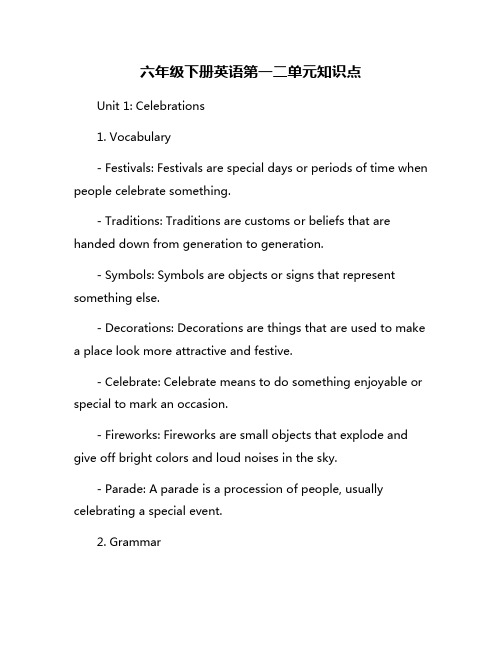
六年级下册英语第一二单元知识点Unit 1: Celebrations1. Vocabulary- Festivals: Festivals are special days or periods of time when people celebrate something.- Traditions: Traditions are customs or beliefs that are handed down from generation to generation.- Symbols: Symbols are objects or signs that represent something else.- Decorations: Decorations are things that are used to make a place look more attractive and festive.- Celebrate: Celebrate means to do something enjoyable or special to mark an occasion.- Fireworks: Fireworks are small objects that explode and give off bright colors and loud noises in the sky.- Parade: A parade is a procession of people, usually celebrating a special event.2. Grammar- Present simple tense: We use the present simple tense to talk about general truths, habits, and routines.- Adverbs of frequency: Adverbs of frequency tell us how often something happens. Some examples are always, usually, often, sometimes, and never.3. Reading and Writing- Reading comprehension: Reading comprehension is the ability to understand and interpret a text.- Writing a diary entry: A diary entry is a personal record of daily events and experiences.Unit 2: Nature1. Vocabulary- Habitat: A habitat is the natural environment where an animal, plant, or organism lives.- Endangered: If a species is endangered, it is at risk of becoming extinct.- Eco-friendly: Eco-friendly means not harmful to the environment.- Pollution: Pollution is the presence of harmful substances in the environment.- Extinct: Extinct means that a species no longer exists.- Conservation: Conservation is the protection and preservation of natural resources.2. Grammar- Modal verbs: Modal verbs are auxiliary verbs that express possibility, necessity, ability, permission, or obligation.- Comparatives and superlatives: Comparatives are used to compare two things, while superlatives are used to compare three or more things.3. Reading and Writing- Descriptive writing: Descriptive writing describes a person, place, or thing in detail.- Writing a persuasive text: Persuasive writing aims to convince the reader of a certain point of view or a call to action.In summary, the first two units of the sixth-grade English textbook cover vocabulary related to celebrations and nature, as well as grammar points such as the present simple tense, adverbs of frequency, modal verbs, and comparatives andsuperlatives. Students also practice reading comprehension, writing diary entries, descriptive writing, and persuasive texts.。
六年级下册英语一二单元知识总结
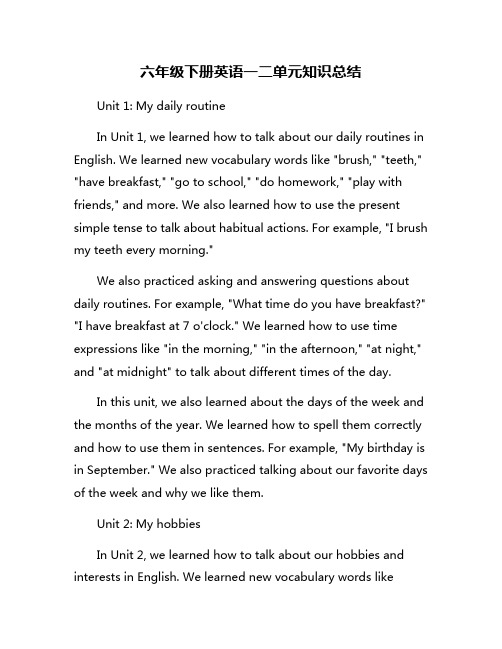
六年级下册英语一二单元知识总结Unit 1: My daily routineIn Unit 1, we learned how to talk about our daily routines in English. We learned new vocabulary words like "brush," "teeth," "have breakfast," "go to school," "do homework," "play with friends," and more. We also learned how to use the present simple tense to talk about habitual actions. For example, "I brush my teeth every morning."We also practiced asking and answering questions about daily routines. For example, "What time do you have breakfast?" "I have breakfast at 7 o'clock." We learned how to use time expressions like "in the morning," "in the afternoon," "at night," and "at midnight" to talk about different times of the day.In this unit, we also learned about the days of the week and the months of the year. We learned how to spell them correctly and how to use them in sentences. For example, "My birthday is in September." We also practiced talking about our favorite days of the week and why we like them.Unit 2: My hobbiesIn Unit 2, we learned how to talk about our hobbies and interests in English. We learned new vocabulary words like"paint," "draw," "dance," "swim," "play the piano," "play soccer," and more. We also learned how to use the present simple tense to talk about things we like to do in our free time. For example, "I like to swim on weekends."We also practiced asking and answering questions about hobbies. For example, "What do you like to do on weekends?" "I like to play soccer with my friends." We learned how to use expressions like "in my free time," "on weekends," and "after school" to talk about when we like to do our hobbies.In this unit, we also learned about different types of hobbies and activities. We learned how to describe them using adjectives like "fun," "exciting," "relaxing," and "interesting." We also practiced comparing different hobbies and activities to say which ones we like the most.Overall, Units 1 and 2 have helped us improve our English speaking and listening skills by teaching us how to talk about our daily routines and hobbies in English. We have learned new vocabulary words, grammar rules, and expressions that we can use in our conversations with others. We have also practiced asking and answering questions, describing things, and comparing different options. These skills will help uscommunicate more effectively in English and expand our language abilities.。
【强烈推荐】辽师大版小学英语六年级下册复习一前单词加课文翻译
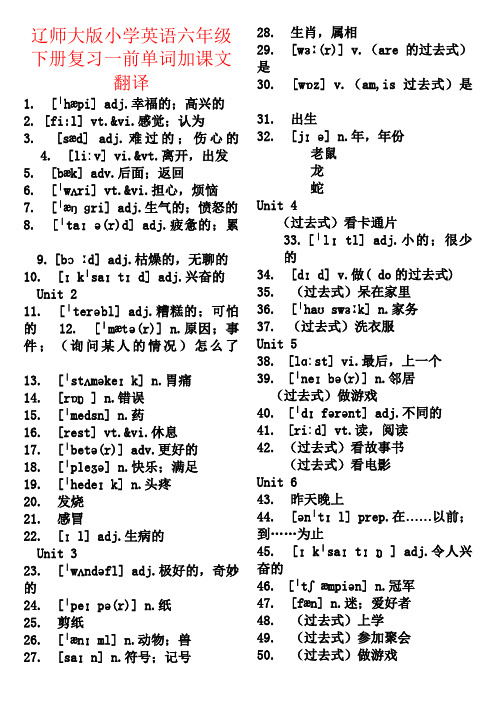
辽师大版小学英语六年级下册复习一前单词加课文翻译1. [ˈhæpi] adj.幸福的;高兴的2. [fi:l] vt.&vi.感觉;认为3. [sæd] adj.难过的;伤心的4. [li ːv] vi.&vt.离开,出发5. [bæk] adv.后面;返回6. [ˈwʌri] vt.&vi.担心,烦恼7. [ˈæŋɡri] adj.生气的;愤怒的8. [ˈtaɪə(r)d] adj.疲惫的;累9.[bɔːd] adj.枯燥的,无聊的10. [ɪkˈsaɪtɪd] adj.兴奋的Unit 211. [ˈterəbl] adj.糟糕的;可怕的 12. [ˈmætə(r)] n.原因;事件;(询问某人的情况)怎么了13. [ˈstʌməkeɪk] n.胃痛14. [rɒŋ] n.错误15. [ˈmedsn] n.药16. [rest] vt.&vi.休息17. [ˈbetə(r)] adv.更好的18. [ˈple ʒə] n.快乐;满足19. [ˈhede ɪk] n.头疼20. 发烧21. 感冒22. [ɪl] adj.生病的Unit 323. [ˈwʌndəfl] adj.极好的,奇妙的24. [ˈpeɪpə(r)] n.纸25. 剪纸26. [ˈænɪml] n.动物;兽27. [saɪn] n.符号;记号28. 生肖,属相29. [wɜː(r)] v.(are的过去式)是30. [wɒz] v.(am,is过去式)是31. 出生32. [jɪə] n.年,年份老鼠龙蛇Unit 4(过去式)看卡通片33.[ˈlɪtl] adj.小的;很少的34. [dɪd] v.做( do的过去式)35. (过去式)呆在家里36. [ˈhaʊswɜːk] n.家务37.(过去式)洗衣服Unit 538. [lɑːst] vi.最后,上一个39. [ˈneɪbə(r)] n.邻居(过去式)做游戏40. [ˈdɪfərənt] adj.不同的41. [riːd] vt.读,阅读42. (过去式)看故事书(过去式)看电影Unit 643. 昨天晚上44. [ənˈtɪl] prep.在……以前;到……为止45. [ɪkˈsaɪtɪŋ] adj.令人兴奋的46. [ˈt ʃæmpiən] n.冠军47. [fæn] n.迷;爱好者48. (过去式)上学49. (过去式)参加聚会50. (过去式)做游戏51. (过去式)看电影52. (过去式)在比赛中获胜53. (过去式)起床54. (过去式)去购物55. (过去式)做作业56. (过去式)吃早餐57. (过去式)打扫房间58. (过去式)做饭59. (过去式)浇花60. (过去式)唱歌跳舞Unit 1 Back to school这是新学期的第一天。
辽师大版六年级下英语复习课件解析

辽师大版六年级下英语复习课件解析一、教学内容本节课为辽师大版六年级下册英语复习课,主要复习本册书中的重点知识点。
包括:Unit 1 Our School,Unit 2 Our Class,Unit 3 My Family,Unit 4 My Home,Unit 5 Clothes,Unit 6 Food,Unit 7 Animals,Unit 8 The Human Body,Unit 9 Seasons,Unit 10 Time,Unit 11Travel,Unit 12 Protection。
二、教学目标1. 能够熟练运用本册书中的重点单词和句型进行日常交流。
2. 能够理解和运用本册书中的固定短语和语法知识。
3. 能够通过复习,提高学生的英语综合素质,为升入初中做好铺垫。
三、教学难点与重点1. 难点:固定短语和语法知识的运用。
2. 重点:本册书中的重点单词和句型的掌握。
四、教具与学具准备1. 教具:多媒体课件、黑板、粉笔。
2. 学具:课本、练习本、文具。
五、教学过程1. 热身(5分钟)教师通过与学生对话,复习本册书中的重点单词和句型。
例如:“What's your name?”, “Where are you from?”等。
2. 课堂讲解(15分钟)教师通过多媒体课件,对本册书中的重点知识点进行讲解,包括重点单词、固定短语和语法知识。
3. 例题讲解(15分钟)教师通过例题,讲解本册书中的重点知识点。
例如:运用重点单词和句型进行造句。
4. 随堂练习(15分钟)教师布置随堂练习,学生独立完成,巩固所学知识点。
六、板书设计教师根据本节课的教学内容,设计板书。
板书内容包括:重点单词、固定短语和语法知识。
七、作业设计1. 作业题目:运用本册书中的重点知识点,写一篇小作文。
2. 作业答案:(示例)My name is Li Ming. I am from China. I have a family. My father is a teacher. My mother is a doctor. I have a brother and a sister. They are in primary school. I like reading books and playing sports in my free time.八、课后反思及拓展延伸1. 课后反思:教师对本节课的教学效果进行反思,分析优点和不足,为下一节课的教学做好准备。
1-6知识点复习

辽师大版快乐英语六年级下册知识点总结Unit 1 Back to school一、重点句子1.询问他人近况的句型: (问句) How are you doing?(答句) I feel + adj (形容词)How come? = Why? 为什么呢?2.I’ve got an A in English. 英语考试中我得了一个A。
3. It’s getting colder and colder.天气越来越冷了。
二、短语及语法(1)don’t worry 别担心、别着急(2)as much as 尽可能多的(3)have a sports meet 举办运动会(4)run fast 跑得很快(5)get the first prize 获得一等奖(6)it doesn’t matter 没关系(7)stay with sb 和某人待在一起(8)I’d love to 我愿意(9)everyone / everybody(每个人)做主语时,后面的谓语动词用单数形式.(10)be ill 生病的(其中be动词要根据它主语而作相应的变化is/am/are)(11)give sb sth=give sth to sb (sb=somebody 某人 sth=something 某物)例如:please give the coat to him=please give him coat.(请把外套给他) (12)现在进行时时态:be动词+动词-ing 形式(表示现在正在进行的动作或状态。
)(13)bored (人做主语)感到无聊的boring (物做主语)令人无聊的(14)excited (人做主语)感到兴奋的exciting (物做主语)令人兴奋的Unit 2 Seeing the doctor一、重点句子1.询问他人病情:(问句) what’s the matter with you ?= what’s wrong with you ? (你怎么了)(答句) I have a + 疼痛部位二、短语及语法(1)see the doctor 看医生(2)take some medicine吃药(3)rest well 好好休息(4)my pleasure = you’re welcome 没关系(5)drink more water 多喝水(6)be absent 缺席,没来(7)you will feel better soon.你不久以后就会好些、你很快就会好的。
六年级英语下册各单元知识点总结梳理
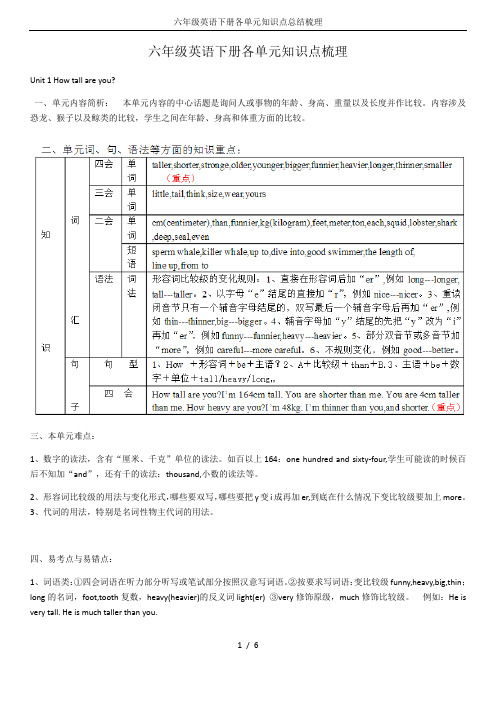
六年级英语下册各单元知识点梳理Unit 1 How tall are you?一、单元内容简析:本单元内容的中心话题是询问人或事物的年龄、身高、重量以及长度并作比较。
内容涉及恐龙、猴子以及鲸类的比较,学生之间在年龄、身高和体重方面的比较。
三、本单元难点:1、数字的读法,含有“厘米、千克”单位的读法。
如百以上164:one hundred and sixty-four,学生可能读的时候百后不知加“and”,还有千的读法:thousand,小数的读法等。
2、形容词比较级的用法与变化形式,哪些要双写,哪些要把y变i成再加er,到底在什么情况下变比较级要加上more。
3、代词的用法,特别是名词性物主代词的用法。
四、易考点与易错点:1、词语类:①四会词语在听力部分听写或笔试部分按照汉意写词语。
②按要求写词语:变比较级funny,heavy,big,thin;long的名词,foot,tooth复数,heavy(heavier)的反义词light(er) ③very修饰原级,much修饰比较级。
例如:He is very tall. He is much taller than you.2、语法、句型类:①How引导的不同特殊疑问句:How be sb.?(问某人状况),How tall/heavy/old be sb./sth?(询问身高、体重、年龄)How long/big/large be---?(问多长、多大)How many/much(问数量、价格)。
②比较级的运用,一定要是相同内容或类别才可以进行比较,这是学生最易出错和混淆娥地方。
例如:Mike’s legs are longer than(John),如果学生翻译会直接填写John,但是一分析就不难发现应该和John的腿作比较的,所以应该是John’s。
再比如My hair is longer than (she).如果不仔细分析大多数学生都会错填成:she,her,但是填hers才是正确的。
- 1、下载文档前请自行甄别文档内容的完整性,平台不提供额外的编辑、内容补充、找答案等附加服务。
- 2、"仅部分预览"的文档,不可在线预览部分如存在完整性等问题,可反馈申请退款(可完整预览的文档不适用该条件!)。
- 3、如文档侵犯您的权益,请联系客服反馈,我们会尽快为您处理(人工客服工作时间:9:00-18:30)。
Unit1-2
一.单词与短语
1.幸福的,高兴的
2.感觉
3.难过的
4.离开,出发
5.后面,返回
6.担心,烦恼
7.生气的
8.疲惫的,累的
9.枯燥的,无聊的10.兴奋的11.可怕的,糟糕的12.原因,事件13.胃疼14.错误15.药16.休息17.更好的18.快乐19.头疼20.发烧21.感冒22.生病的(基本)
1.第一天,
2.在学校门口,
3.回到…,
4.给她写邮件
5.踢足球,
6.画画
7.弹钢琴
8.放学后
9. 一场运动会10.赛跑11.打篮球12.努力工作13.保持微笑14.没有钱15.把…给…16.去南方17.跟…待在一起18.看医生19.吃药(两种)20.感觉好点(补充)
一.重点句子
1.我很高兴回到学校。
_____________________________________________________________________
2.你感觉怎么样?我感觉很伤心。
_____________________________________________________________________
3.怎么了?我的好朋友劳拉要离开了。
_____________________________________________________________________
4.她将要回英国了。
_____________________________________________________________________
5.你可以给她写邮件。
_____________________________________________________________________ 6.他得到了第一块奖牌。
_____________________________________________________________________ 7.她一块奖牌也没得到。
_____________________________________________________________________ 8.我们班每个人都很兴奋。
_____________________________________________________________________ 9.我们队赢得了比赛。
_____________________________________________________________________ 10.你感觉好点了吗?
_____________________________________________________________________ 11.怎么了?(两种)
_____________________________________________________________________ 12.我胃疼/头疼/感冒/高烧。
_____________________________________________________________________ 13.让我们看医生去吧。
_____________________________________________________________________ 14.别担心。
吃点药好好休息。
_____________________________________________________________________ 15.你很快就会好起来的。
_____________________________________________________________________ 16.多喝水。
_____________________________________________________________________ 17.很抱歉(听说你病了)。
_____________________________________________________________________ 18.你吃药了吗?
_____________________________________________________________________ 19.现在我不得不回家了。
_____________________________________________________________________ 20.请把我的坏牙齿拔掉吧。
_____________________________________________________________________。
